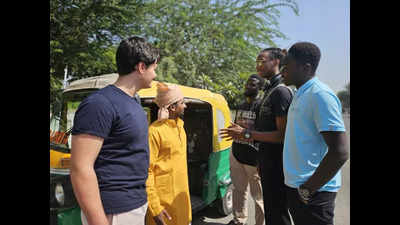- News
- City News
- noida News
- ‘Salama’, ‘namaste’: How greetings are spreading warmth & building trust
Trending
‘Salama’, ‘namaste’: How greetings are spreading warmth & building trust

Deepak, who grew up in Bareilly, confesses he knows only these words, but it's enough to get him a smile and a passenger in his auto. "Call them in their own language, and the passenger is yours. Good for business," he grins. He can also manage the polite Malgasy (language spoken in Madagascar) greeting, ‘Salama tompoko', but Deepak simply goes with ‘Salama', and it works. "Everyone loves their mother tongue, so they pay attention when I speak to them," Deepak beams. Moreover, he adds, "foreigners do not bargain".
In a relationship that has over the years been marred by distrust and episodes of racist abuse, these are refreshing sparks fostering bonding, even if transactional ones, between locals and foreign students. Like Deepak, who studied till Class 3 and only speaks Hindi, other locals who run businesses have picked up a smattering of languages they hear the foreign students speak so that they can get a loyal clientele.
Deepak has also been learning English – "from YouTube and by jotting down new words I pick up from passengers and learning their meaning online", he says.
"There are several foreign students who are my regular passengers," says Mukesh. "Take Lincoln, for example. Whenever he takes a ride on my auto, I greet him with ‘ya kake'(‘how are you doing' in Hausa). Lincoln has saved my number and calls me whenever he needs a ride. This has built both familiarity and trust," he adds.
It works the other way too, with some foreign students picking up Hindi to make their lives easier as they go out to shop or for a ride. With a ‘namaste' and folded hands, they can never go wrong.
It's also useful to convey how exactly they want their "machhli tikka, kebab and butter chicken" made, three dishes that appear to have outpaced others in their popularity among foreign students. "That's food for me now," says Zola, a student.
"I have been staying in Noida for three years, and I've learnt that one needs local support. Noida now feels like home," says Benn Uche from South Africa, who is currently pursuing MBA at a private university in Greater Noida. Ben says he faced racial comments when he initially arrived in India and went house-hunting, but not after that.
Some shopkeepers have, meanwhile, gone the extra mile to stop products from Africa miss. Nitesh, a grocery store owner near Knowledge Park, has devised an ingenious import route. He simply asks some of his foreign customers to get certain products in bulk when they go home, buys it from them, and sells those "for a small profit" to others. "Some students request items like fish oil, dried stockfish, and other packaged foods that are not available here. If anyone is going to their homeland, usually once or twice a year, I ask them to bring me those items and they oblige," he says. But INA market in Delhi remains the place foreigners have to make regular trips to if they want to buy anything that's uncommon, something that markets in Noida and Greater Noida need to catch up on.
End of Article
FOLLOW US ON SOCIAL MEDIA
Visual Stories
Hot Picks
TOP TRENDING
Explore Every Corner
Across The Globe










